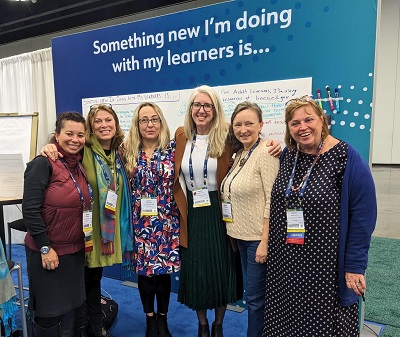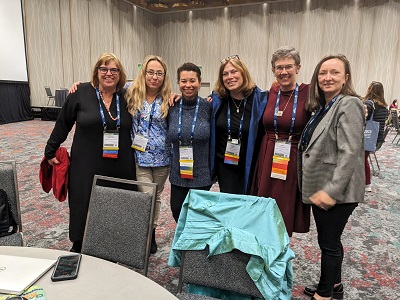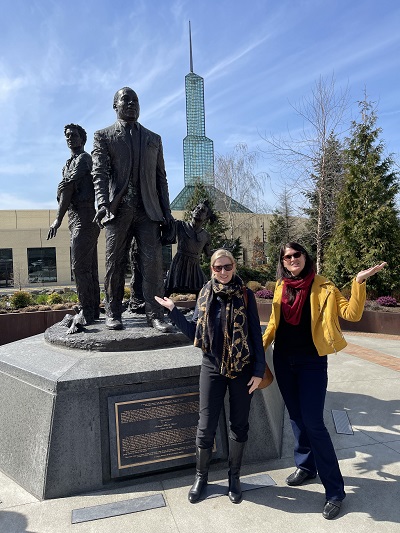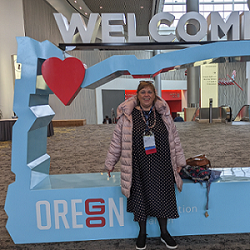|
Contribution 1: Andrea Lypka, Pinellas Education Foundation
Attending and presenting at the TESOL 2023 International Convention in Portland was both professionally and personally a rewarding experience. Along with Barbara Lapornik, Jennifer A. Lacroix, Leslie Bohon, and Josephine Prado, in the ICIS Academic Session “Interculturality and Storytelling,” I shared the ways digital and multimedia storytelling and everyday lived experiences promote identity development and cultural consciousness. Personal experiences, showcases of media platforms, stories, duoethnographies, and prose-poetry, and learning activities using Circle Paseo, Story Circles, mini-saga writing activities, and student-created digital storytelling can expand readiness to interact across cultures and redefine our place in the community and the world.
In the “Open Windows to the World: Developing Intercultural Understanding Through Reading,” along with Amina Douidi, Christy Williams, Patricia Lorena Bustos Gonzales, and Barbara Lapornik, I discussed the importance of critical reading of both fiction and nonfiction, highlighting cultural differences and hybridity, and native cultures and
their inclusion in various educational contexts. We also shared the role of critical reading within inclusive and anti-bias education.
In the CALL - ICIS Inter-section panel, “Teaching Intercultural Competence in the New Global Techno World,” with Thomas N. Robb and Judy Wong, I highlighted the importance of intercultural competence, teaching projects that included service-learning and virtual intercultural exchanges, and the recent challenges faced by teachers in this new techno world. This panel was impactful because the attendees also shared their experiences as well as methods and tools to implement in the classroom to foster an appreciation for diverse peoples, languages, and cultures.
The highlight of TESOL International Convention in Portland is the value of immersive engagement, the in-person, one-on-one connection, and social interaction with professionals in the field of English language teaching. Since the pandemic, I have attended and presented at TESOL conferences virtually but felt that online events lack a sense of immersive experience, place, intimacy, and connection. I also felt that I could never fully engage virtually because of my urge to multitask. This year, I was excited to finally give talks, attend dinners, network with like-minded colleagues, many of whom I had only met through Zoom previously, and explore cultural and historical places such as the Portland Japanese garden and Multnomah Falls. Friends from the ICIS leadership team, past conferences or from the era of the pandemic, and new TESOLers – you all made TESOL 2023 memorable; I am proud to be part of this community. You all inspire and energise me, and it was so good to see you all! I look forward to the TESOL 2024 Convention in Tampa!
Contribution 2: Leslie Bohon, University of Richmond, Virginia, USA
A reflection from the TESOL Convention I would like to share is based on the ICIS Academic panel called “Interculturality and Storytelling.” In this session, several team members discussed the importance of using storytelling to increase intercultural communication competence, empathy, and language skills in the English language classroom. The presenters described storytelling methods along with successes, challenges, and tips for incorporating these activities in our own classrooms.
First, Jennifer Lacroix described a Funds of Knowledge (FoK) Methodology (Vélez-Ibáñez & Greenberg, 1992) for intercultural storytelling. She explained that FoK methodology was created for the K-12 sector to connect home and work to school. Students create a “Who Are You?” project either in digital or written form. Students are able to use their everyday lived experiences and knowledge to showcase their abilities. They also communicate their identities (such as caregivers, and translators, among others), which makes the curriculum more meaningful and connected. Second, I described a storytelling method I use, Circle Paseo, in my university courses for international students. Circle Paseo’s goals are to examine our identity in order to inform our understanding of diversity and culture, make connections between who we are and how that shapes decisions, and strengthen reflection and empathy skills. Participants start by writing descriptors of themselves (examples: woman, student, multilingual speaker, family member) and then participate in short discussions in duos to explore how those descriptors shaped them. A big takeaway for Circle Paseo is a realization of the impact of identity on outlook. Third, Barbara Lapornik showcased several writing projects she uses with her secondary EFL students in Italy. Her students’ projects explore identity through the “6-word story,” “mini-sagas,” haikus, and “Story Circles,” among others, and beautifully illustrate students’ growth and reflection. Fourth, Andrea Enikő Lypka described storytelling projects (Digital Duoethnography) she leads with her university EAP writing students. Her students enjoyed this digital collaborative project that includes brainstorming to find common interests, collecting data, collaborative writing and analysis, and sharing a final product. Self-awareness and learning as a process were two positive takeaways expressed from her students. The fifth and final part of this presentation was Josie Prado’s Story Circles. Josie uses this method in her Adult Community English course. Story Circles involves students working in small groups to relay stories about their lives, thoughts, and experiences. The method is used to increase listening skills for understanding and resolving conflict. the activities are diverse in duration and focus. I believe that regardless of how any of us choose to incorporate storytelling as a language and communication learning tool, there is a method that can be found to fit our needs. Please feel free to learn more about storytelling and interculturality here in the presentation.

ICIS Networking session with ICIS leaders Daniela Silva, Leslie Bohon, Andrea Lypka, Jennifer LaCroix, Roxanna Senyshyn, and Barbara Lapornik.

Meeting other IS leaders.. Barbara Lapornik, Andrea Lypka, Daniela Silva, Leslie Bohon, Josie Prado, and Roxanna Senyshyn.
Contribution 3: Sarah Hopkyns, St Andrews University, UK
It felt wonderful to return to the TESOL International Conference this year, after such a long time away. I had been looking forward to the Denver one in 2020, only to have the trip canceled at short notice due to the COVID pandemic! Attending online hadn’t felt quite the same. I had missed the buzz of the live event and the opportunities to network with old and new friends and colleagues. Despite the long flight from Abu Dhabi to Portland (just over 19 hours!), I felt excited to attend talks, workshops, and keynote sessions, as well as present my own research and explore the city.
I presented two research projects at the conference. The first was co-presented with fellow ICIS leadership member, Melanie van den Hoven. Our talk was called ‘binary linguistic descriptors of teachers to empowering plurilingual identities’. We shared findings from an ethnographic study with Emirati college students which looked at the labels they assign to their English-medium instruction (EMI) teachers. One interesting finding was that proficiency in Arabic rather than English was a key descriptor. We provided suggestions on ways to promote greater linguistic awareness of plurilingual identities in our context of the United Arab Emirates, and beyond. Audience members asked good questions which pushed us to think of new tangents to explore. My second talk was on ‘Context-specific COVID-19-era higher education: Toward greater linguistic and cultural inclusion’. I explored Emirati university students’ perspectives on emergency remote teaching and learning (ERT&L) during the pandemic using a phenomenological case study approach. Drawing on intersectionality and Goffman’s theories, my analysis revealed context-specific cultural and linguistic challenges, such as reluctance to show faces online due to cultural norms, for example. The session ended with suggestions for more culturally and linguistically responsive online teaching in post-pandemic times.
My co-presenter, Melanie van den Hoven, and I were very pleased we decided to drop by the ICIS leadership team meeting towards the end of the conference! We found our tribe! Plenty of shared research and teaching interests meant it didn’t take much encouragement for us to join as ‘members at large’. We ended the conference with some exploring of affectionately ‘weird’ Portland. Highlights were Powell’s bookstore (visited twice!) and Voodoo’s donuts – highly recommend the ‘grape ape’! Looking forward to deepening the connections made with the ICIS team over the next year.

Sarah Hopkyns and Melanie van den Hoven exploring Portland.
Contribution 4: Barbara Lapornik, LS F.Prešeren, Trieste, Italy
Of all the aspects one can focus on while remembering this year’s convention, I would like to choose the way I experienced those panels and meetings our ICIS organized or co-organized directly.
Firstly, the panels, in which two of them I acted as the coordinator. I am referring firstly to the academic panel on storytelling and the intersection panel with the RVIS on critical reading, to which we have to add the intersection panel on interculturality and the virtual world under the coordination of the CALL-IS. As the panels were already described in detail by the two previous contributions by Prof. Andrea Lypka and Prof. Leslie Bohon, I would like to underline here what definitely struck me, i.e., the warm and genuine participation of the attendees, and the interest shown during the question and answer time. They instantly connected the outcomes of the work they were presently centered on with the ideas we presented, reporting personal experiences and challenges. One truly cannot wish for a warmer, more present, and participative audience!
Secondly, our open business meeting, where TESOL members are invited to get acquainted with ICIS’ mission and focus, what was done in the previous year and what lies ahead. Though the group attending was not the largest we have had considering also the pre-pandemic time, it was an extremely productive one, as some colleagues, met for the first time on this occasion, have now joined our leadership group. What amazed me was both the quality of their research as well as its geographical expansion, ranging from the West of the US, Europe, to the Middle and Far East. The link connecting purely academic, and production or work settings further opened up a newly envisaged range of possibilities, with also geographically stimulating connections.
Thirdly, the COP fair. Imagine a hall with all the TESOL Communities of Practice, finally a physical place of networking professionals, who moved among the ISes’ tables, loaded with PCs and leaflets, enquiring, presenting their research, interest, or needs. I had the fortune to speak also to some long-term TESOLers, who began some decades ago, sharing with me their professional achievements, disclosing what were some efforts of their own generation, and the main changes in the ELT profession they had witnessed. It was a professionally relevant history I had the occasion to listen to and be enriched by, placing our present work in a wider perspective. It gave me the feeling of being totally immersed in our profession and definitely part of a real, same-goal-pursuing community.
The personal and the communal, the present and the past, geographical diversity and historical depth, all this definitely enriched my Portland experience.

|

